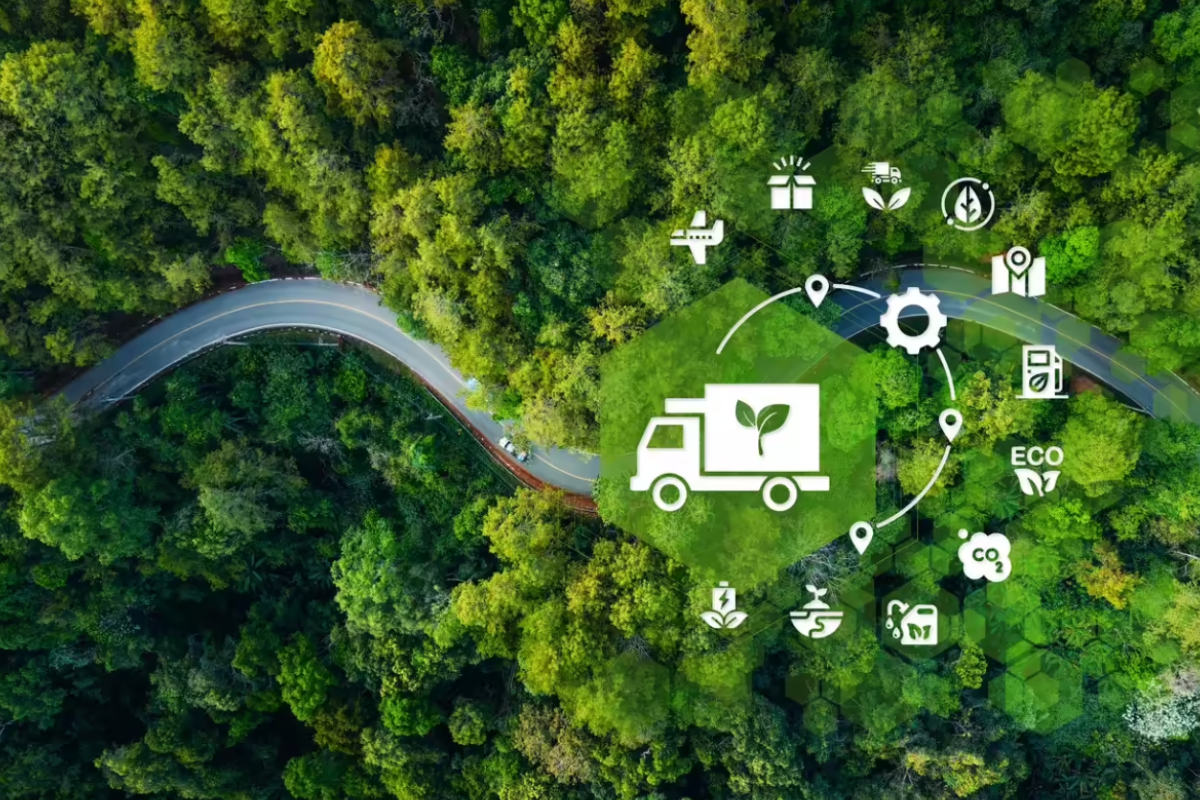
The Role Of Sustainable Forklifts In India’s Green Logistics Movement
The sector of logistics in India takes a turn. It is now necessary that speed and scale are responsible. Demand for faster deliveries clashes with urgent environmental concerns. According to the International Energy Agency, logistics contributes nearly 10 percent of CO2 on the planet. The demand to use the environmentally friendly forklifts has never been louder. Considering the fact that the air quality in India has already been compromised.
Companies understand sustainability is not only a choice of convenience, it is a survival mechanism. This shift in electric forklifts in India is indicative of how technology is transforming the supply chain into something cleaner and more efficient, and in the case of the warehouses and factories, the advent of lithium-battery forklifts is the beginning of a green revolution that will commence in the future.
Understanding Sustainable Forklifts – What Makes Them Different?
Fossil fuels are consumed in diesel forklifts, and modern forklifts run on improved or cutting-edge electric or lithium batteries. BYD lithium forklifts are different since they have safe iron-phosphate chemistry to exclude the harmful toxins. It was found in a study by Harvard that lithium systems have a long performance when compared to lead-acid batteries. Instead of causing fuel spills, poisonous fumes, and obstructing noises, these forklifts make smooth, quiet and clean records.
In the case of industries that depend on material-handling equipment, this distinction is significant- it assists companies to mitigate potential risks, minimise the emissions and develop less hostile workplaces. The benefits of lithium forklifts are not just of technical nature and ideas but also ethical, as long as the planet is being a cleaner place to live in by the generations yet to come.
India’s Growing Demand for Eco-Friendly Logistics Solutions
The use of e-commerce, retail, and manufacturing are growing. Warehouses are getting longer working periods and more work. This compels India to redefine the logistics approach. The McKinsey study indicates that sustainable practices by companies bring about investor confidence. Due to this, the adoption of eco-friendly forklifts in India is growing by more firms.
The value placed on zero-emission forklift India is indicative of a larger trend: the customers, regulators, and an entire network of partners worldwide would like the supply chains to be cleaner. In the case of Indian companies, electric conversion of the material handling is not merely a trend, it is a gateway to international commerce and enhances the reputation.
How Electric & Lithium Forklifts Support Sustainability Goals
Sustainability expectations seek action and not rhetoric. Lithium forklifts in India work out that. They decrease the use of diesel, minimize waste in energy, and optimize day-to-day operations. A study conducted at MIT confirms that industrial fleet electrification can reduce a lifetime emission by 35%. BYD lithium forklifts can be counted on, where charging is done quickly, and its batteries can work continuously.
With the application of efficiency coupled with eco-responsibility, these forklifts put India a step closer to achieving its climate goals. The changes have already brought benefits to the firms that previously were reluctant in their move to enhance performance and as sustainability promises.
Reducing Carbon Emissions in Warehousing & Manufacturing
The most apparent problem in logistics nowadays is the emissions of carbon. Diesel forklifts produce carbon monoxide, nitrogen oxides, and particulate matter, all of which are damaging both to workers and the environment. These risks can be lowered instantly by switching to zero-emission forklifts.
The WHO has found that respiratory complications among the workers were caused by immune health issues because of pollutants of industrial machines in their workplaces. The use of eco-friendly forklifts will save both the planet and the employees. There is cleaner air, healthier places to work at, and improved adherence to the environmental laws in warehouses and factories. In time, such changes will help save lives and establish confidence of consumers and partners supporting responsible operation.
Cost Efficiency of Sustainable Forklifts in Logistics
There has been a perception that sustainability is a costly principle, but that is not the case. Lithium forklifts save money in the long term. According to a Deloitte study, up to 25% of operating cost can be saved by operating electric fleets as opposed to diesel. This is saving on the basis of having no fuel costs, poor failure, and very low services. BYD lithium forklifts are capable of reducing costs in warehouses due to fast charging and long cycles.
Despite the fact that initial investment is larger, the payback period is shorter, though, and such forklifts can be considered making a good financial decision. With such a thin margin in a market, this cost efficiency renders the transition rational and hard.
Government Push Towards Clean Energy & Green Warehousing
Policy has a critical influence in the future of the logistical landscape of India. The Faster Adoption and Manufacturing Hybrid and Electric Vehicles (FAME) scheme provides incentives to the government to help businesses investing in clean-energy solutions, including sustainable forklifts. The commitment of India to the climate in the Paris agreement motivates companies to reduce emission.
The use of electric forklifts to replace the current one would make warehouses compatible with international environmental practices. NITI Aayog reports that electrification would help the logistics sector in India reduce its energy expenditures by a third. Governmental assistance is given impetus to the transition of the industry towards the field of sustainability.
Case for Electric Forklifts vs Diesel Forklifts in India
Electric forklifts and diesel forklifts in India are no longer level in terms of debate. Diesel models continue to perform, and offer greater costs, pollution, and involve increased safety hazards. In contrast, lithium forklifts in India provide cleaner operation, less downtime, and higher levels of workers security.
A study by the U.S. Department of Energy indicates that lithium-ion equipment costs less to operate in terms of power use as compared to combustion engines. Electric fleets perform better than diesel over a period of five years in cost and reliability. In the case of business ventures that consider global markets, the conversion to electric forklifts also implies a more strict adherence to the rules of the international environment. The argument is obvious, diesel is in the past, lithium is the future.
Adoption Challenges & Opportunities for Indian Businesses
Although the benefits are obvious, there are obstacles. The greater initial expenses and fewer points of charge impede adoption. But possibilities are more than these constraints. Research conducted by PwC indicates that with improvement of battery technology, prices will keep dropping at 10 per cent annually. The early pension made by the companies in BYD lithium forklifts make the companies leaders in sustainable logistics.
New work prospects are also being created either through the servicing of batteries or in the infrastructure setting up through the growing impetus to get sustainable forklifts in India. Offering solutions to these difficulties, businesses not only achieve savings, but they also establish resistance toward fuel unpredictability and regulatory changes.
The Future of Sustainable Forklifts in India’s Supply Chain
The sustainability of logistics in India is very much linked to the future of logistics. As rising environmental issues dominate, joining the industry will become the norm very soon, with electric material handling in India taking its standard picture.
Whether for cost, safety, or world respect, businesses currently implementing zero-emission forklifts are reaping benefits in the long-term perspective. There is an emergence of lithium battery forklifts in India that will have taken over supply chains with sustainable and cost effective solutions to all sectors. It is already a reality, not intended to happen at some far off day. In the case of India, sustainable forklifts are not all about logistics, this is a cleaner, more intelligent economy.
Conclusion – Driving India’s Green Logistics with Smart Forklifts
Green logistics is not something of the dream world anymore. The number of BYD lithium forklifts in the trip cannot be denied. They reduce emissions, are economical and provide performance that cannot be matched. These forklifts are the ideal option to companies that want to minimize warehouse expenses and safeguard the planet.
In choosing eco-friendly forklifts in India, companies will lead in the sustainability initiative in India. The way ahead is easy: creativity, accountability and expansion. Sustainable forklifts are machineries like no other, but the catalysts of the Indian green logistics revolution.
